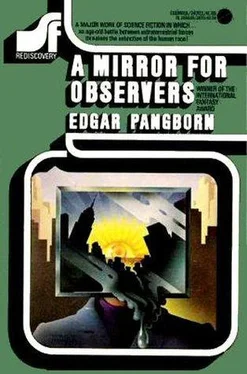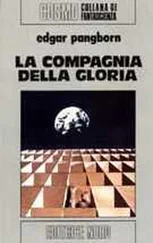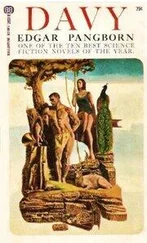When I was passing EL CAT SEN, and heard a whispered “Hey!” above me, I had to glance back and make sure that Billy Kell had gone, before I dared look up to the pale flower that was Sharon’s face in a second-floor window. “Hello, honey — too hot to sleep?”
“Yeah, heck.” I could see her arms on the sill, and darker flowers that would be her eyes. “The moon was all smoky round the rim, Ben. Well, I might come on down the rainspout, but frankly I haven’t got anything on, frankly.”
“Some other time.”
“Were you chasing Billy?”
“Was that Billy? I didn’t notice. No, just out for a breath of air. Maybe you’d better go back to sleep in time to wake up.”
“Think I better? By the way, I drew a keyboard on my bed table, only I couldn’t fix anything to make the black keys stand higher.”
“I’m going to figure out something better than that.”
“Huh?” It was the blank puzzlement of a child not accustomed to expecting much unqualified good from anyone. Having met her peevish little father, I wondered how even the money for the lessons had been forthcoming. Some probably transitory pressure from the mother with Headaches, I guessed: it wouldn’t see Sharon through, on the steep road I knew she had to travel. I made up my mind, and found comfort in doing so.
“I’m going to talk with Mrs. Wilks. I think I can arrange better practice time than you can get at the school…. Ter?”
“Rif,” Sharon sighed. “Can you? Oh, rif!”
I did not see Angelo that morning or afternoon. I went downstairs in the late morning, but Rosa told me he was under the weather; she was keeping him in bed and thought he was asleep. A cold, she guessed. She was not worried: he had them rather often. That alone informed me that he had said nothing to her about the gang. A cold!
In the afternoon I did accomplish one thing. I have committed us, Drozma, to an obligation which I think our little department of finance in the Toronto enclave will be pleased to honor. The money required is not much, and I can think of it as something good achieved even if my mission should end in failure. I went to see Mrs. Wilks, who used to be Sophia Wilkanowska, and as I had anticipated, it was not difficult to establish a meeting of minds. She is a genuine teacher — that is to say, a lover of her own kind uncorrupted by the pressures of every day: they beat upon her as they do upon everyone, but without destroying her spirit.
She is tiny, porcelain-pale, with a deceptive look of fragility. She lives on a quiet street just barely on the right side of the tracks (I have sent the address to the Toronto Communicator) with a sister who has scant English but is not blind. They manage. Sophia’s English is adequate. When I spoke Polish she was happier, and friendship was easy from that moment on. These two escaped from blighted captive Poland in 30,948, when Sophia was already fifty, her sister forty-eight; I thought it better not to ask how Sophia’s husband died. They both dye their hair brilliant black, and they have a few other gentle vanities, and music is in Sophia like the fire in a diamond, indestructible.
We talked about Latimer, which is not indifferent to music in this fairly leisured decade. Prematurely, because there were many other pressures on my mind, I suggested expanding their studio into a small school. They said: “But — but—”
“I’m an old man. I have money — Canadian securities, other resources which I can’t take with me. What better monument?” I pointed out that the house next door to them was vacant. There could be a partnership, perhaps, with one or two other Latimer teachers — and free practice rooms for promising students like Sharon Brand. Sophia Wilkanowska was not displeased to notice that cat coming out of the bag. She knew what Sharon was: if she had not, she would not have been the teacher I wanted for the child. I would buy and equip the house, I said, my part in it strictly anonymous. I would deed it over, guarantee upkeep for ten years; the rest was up to them. For an hour or so I let the idea develop in their disturbed, not quite believing, but essentially practical minds, as we sat about and talked Polish and drank wonderful coffee from tiny transparent cups which had somehow made that dark journey with them fifteen years before. Sophia was pleased to call me a good pianist after I played a Polonaise to her restrained satisfaction. I was an expansive, eccentric, aging gentleman, vaguely Polish-American with money in the background, who wanted a little unlabeled monument for himself. It made sense gradually. More to me than to them, but at length I “confessed” — told them I had happened to get acquainted with Sharon and hear her practice. I had learned that she could not have a piano at home and I was angry. I loved her, I had no children of my own, and anyway I still wanted that monument.
They took it from there. “It is dangerous,” said Sophia, “to have that little one’s hunger. Before her first lesson I had thought my own hunger was — do you know? — hammered away under the fingers of little brats who — never mind. But what is there for her, Mr. Miles? School or no school? In this world or any other?”
“Trial. Victories, defeats, maturity. The worst cruelty would be to protect her from the pain of struggling.”
“Oh, dear God, true enough. And we accept your offer, Mr. Miles.”
This much is done.
I finished that chapter a week ago, in my stuffy room, the evening after meeting Sharon’s teacher. I was waiting there for the gradual coming of summer darkness. Tomorrow I shall not be dead, but Benedict Miles will be. I am writing now in haste, Drozma, to complete my report, to convey to you a resolution from which not even you, my second father, can swerve me.
When darkness came that evening I took Andy out of the garage on Martin Street — seeing there the neat car that had been Feuermann’s — and drove to Byfield. I parked off the highway, cut through a small patch of woods, clambered over the cemetery fence. Moonrise had not yet come.
I could always find peace among the human dead. They are surely our kindred here at least: our five or six hundred years make no more ripple in eternity than the comic hurry of a second hand. I found the bank where Angelo and I had waited on Jacob’s ritual, and fumbled at Mordecai Paxton’s headstone for traces of the dandelions. They were still somewhat more than dust. I went to the grave of Susan Feuermann.
It was ten days since Feuermann had gone to Byfield and only an image of him returned. That had been a day of rain; none had fallen since. They are tender of their memorials here. The grass is trimmed; I saw fresh decorations on many stones. There are other places, away from this modern part, where nature has been allowed to shelter the fallen in her own fashion, and grass is tall, with here and there a few of the unimperious flowers that men call weeds.
I searched for signs of a tragedy darker than any of the deaths commemorated here: Jacob Feuermann had died not from age, or chance, or in the witless attack of illness, or through any fault or quality of his own, but, like a child in a bombed city, had been arrogantly shoved out of life in a conflict not of his making.
In ten days the grass had fairly righted itself, patiently following its own privilege of life, but still leaned enough for me to discover where something had been dragged to an area of lower ground behind a screen of willows. In that hollow Namir had covered his traces casually: it might cheat the uncritical eye of whatever attendant cared for the graveyard. On this ever-shaded ground the turf was thin and mossy. Namir had rolled some of it back, scattering surplus earth with scant effort at concealment. Replacing the turf, he had joined the edges: I could find them.
Читать дальше












